Related Links
Previous Presidents
Beloit College developed from the vision of seven New Englanders, a vision that began taking shape as they met in a stateroom of the steamer Chesapeake, crossing Lake Erie in early summer 1844.
Their plans led to a series of four conventions involving both clergy and laity from northern Illinois and southern Wisconsin. Known as Friends of Education, these participants gathered to consider offers for a frontier college.
The Friends of Education accepted an offer of $7,000 in supplies, materials, labor, and a small amount of cash from the village of Beloit. This was the backbone of the College’s corporeal form. Members of the third and fourth conventions chose a Board of Trustees. The board members adopted a charter that was enacted into law by the Territory of Wisconsin Legislature on Feb. 2, 1846.
The foundation for Middle College, the oldest college building northwest of Chicago in continuous academic operation, was laid in 1847, and classes began that fall. The College conferred its first degrees in 1851.
Progress
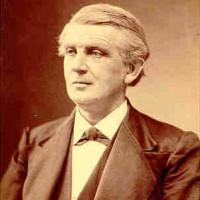
Aaron Lucius Chapin
1st President (1849 to 1886)
The College’s early curriculum was cast mainly in the Yale mold. Aratus Kent, chairman of the Beloit College board of trustees, and the first faculty members, Jackson J. Bushnell and Joseph Emerson, built a solid casing with Yale mortar before another Yale graduate, Aaron Lucius Chapin, accepted Beloit’s first presidency in December 1849. He served until 1886, and during his presidency the College became widely known for its scholastic excellence.
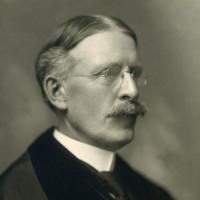
Edward Dwight Eaton
2nd President (1886-1905, 1907-1917)
From its beginning, the College showed both a solid classical tradition and a penchant for innovation and experimentation in curriculum. The administration of Edward Dwight Eaton, Beloit’s second president, witnessed the addition of a philosophical course to the classical groundwork, including new emphasis on the sciences. A course in evolution was offered as early as the 1890s, whereupon students were given greater latitude in the selection of their courses. Beloit enrolled its first women students in 1895.

Melvin Brannon
3rd President (1917-1923)
New courses and other innovations, including home economics and journalism, flourished under Melvin Brannon’s administration after World War I. The Brannon era saw substantial growth in the endowment assets of the College and a refurbishing of the physical plant.

Irving Maurer
4th President (1924-1942)
Irving Maurer returned to his alma mater as president in 1924 and served until his death in 1942. The period of 1927 to 1933 was, like the 1890s, a remarkable building era. President Maurer’s administration also put renewed emphasis on the liberal arts and spiritual values, and continued resistance to the post-war demand for the “practical.”
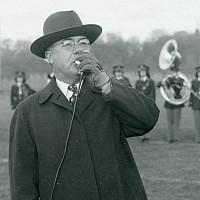
Carey Croneis
5th President (1944-1954)
After a period of more than two years, when World War II sharply reduced enrollment and presented many other problems, Carey Croneis became president in 1944. The nine-year administration of Beloit’s fifth president saw an influx of war veterans swell enrollment to more than 1,000, and additional buildings and other campus improvements were completed. As Beloit celebrated its centennial, President Croneis noted that the College had grown to a “lusty educational manhood surpassing anything that President Chapin envisaged.”
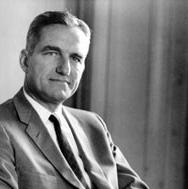
Miller Upton
6th President (1954-1975)
The administration of Miller Upton, who served for 21 years, was marked by a long period of intensive self-study. This led to a series of far-reaching curricular changes, including enrollment growth to the highest level in Beloit’s history and the extensive development of the physical plant. This building period included a new library, science center, performing arts center, anthropology building, and seven new residential buildings. The College’s “World Outlook” program was inaugurated in 1960 and continues today. The innovative “Beloit Plan” of year-round education, introduced in 1964, brought increased national recognition to the College, and many elements of that distinctive curricular program also continue today.

Martha Peterson
7th President (1975-1981)
Beloit’s seventh president, Martha Peterson, was inaugurated in the fall of 1975 and served until her retirement in 1981, when she was named president emerita. She had come to Beloit after serving as president of Barnard College for eight years and as former chairman of the American Council on Education. In her inaugural address she asked “all who love and respect this historic College to help us hold high the banners of our traditions, our liberal arts commitment and our daring to be different.”
During the late 1970s, the College responded effectively to problems of smaller enrollments, an altered pattern of student interests and the demands of an inflationary economy. A traditional two-semester academic year was restored, extra-curricular life enhanced, improvements to the campus completed and the endowment resources expanded. A long-range plan for the 1980s also was developed.

Roger Hull
8th President (1981-1990)
Roger Hull was elected as Beloit’s eighth president in 1981. During his administration, enrollment increased each year and the endowment reached its highest level in history. Annual fund raising and alumni support also reached record highs. At the same time, significant new academic and career counseling programs were introduced. The Hull years saw accelerated plant improvements, including new facilities for music and economics, extensive renovation of residence halls, creation of a new campus center and sports-fitness center and a multi-million-dollar library renovation. Hull left to assume the presidency of Union College in New York in 1990.

Victor E. Ferrall, Jr.
9th President (1991-2000)
Victor E. Ferrall, Jr. was named Beloit College’s ninth president in 1991. A lawyer with a passionate commitment to liberal education, he presided over the College’s 150th Anniversary celebration, which included the successful completion of the $100 million Sesquicentennial Campaign. During his tenure, the College’s endowment more than doubled and Beloit College undertook one of the largest programs of physical plant reconstruction in its history. Both College Museums, residence halls, academic facilities in Morse-Ingersoll and Smith halls, and sports facilities at Strong Stadium, underwent major renovation. A state-of-the-art fiber optic network was installed, and Karris Field and The Beloit Poetry Garden were added to the campus.

John E. Burris
10th President (2000-2008)
John E. Burris, director of the Marine Biological Laboratory in Woods Hole, Mass, became the College’s 10th president in 2000. During his tenure, the faculty grew by 11 positions and applications to the college increased by 65%. Construction of the Harry Moore Townhouses and two new townhouses and several major renovations in the College Park Historic District added additional housing. A campus master plan was developed which included the acquisition of the western portion of Emerson Street and portions of College and Clary streets. Construction began on the Sanger Center for the Sciences in 2007.
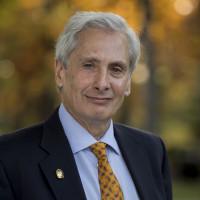
Scott Bierman
11th President (2009-2023)
Scott Bierman brought a 14-year legacy of vision, financial stability, innovation, and the leadership required to calmly steer the campus through a global pandemic.
Bierman put a COVID-19 safety and health plan in place early, had the foresight to transform a decommissioned electric power station into the Powerhouse, a hive of student recreation, athletics, and learning, and strengthened the college’s financial position.
Taking up the financial reins during a recession, Bierman reduced nearly all of the college’s external debt, streamlining operating expenses, and increasing net-tuition revenue.
Under Bierman’s leadership, the college’s Advanced Mentoring Program (AMP) and experiential learning initiatives have garnered high marks, including in the 2022-23 U.S. News & World Report rankings. He was also the leader behind Impact Beloit, which will open in fall 2024 and expand the college’s community-based learning and career-readiness initiatives, and provide resources and partnerships with the greater Beloit community.
On campus, Bierman was well known for his sincerity and humor, even giving first-year students a pair of signature turtle mascot socks – a Bierman tradition.